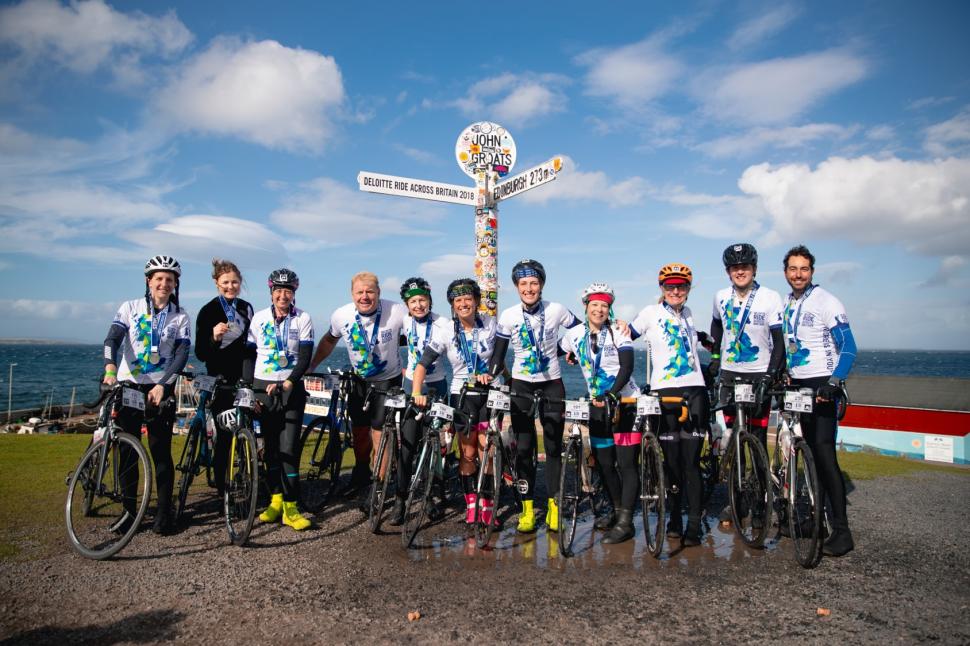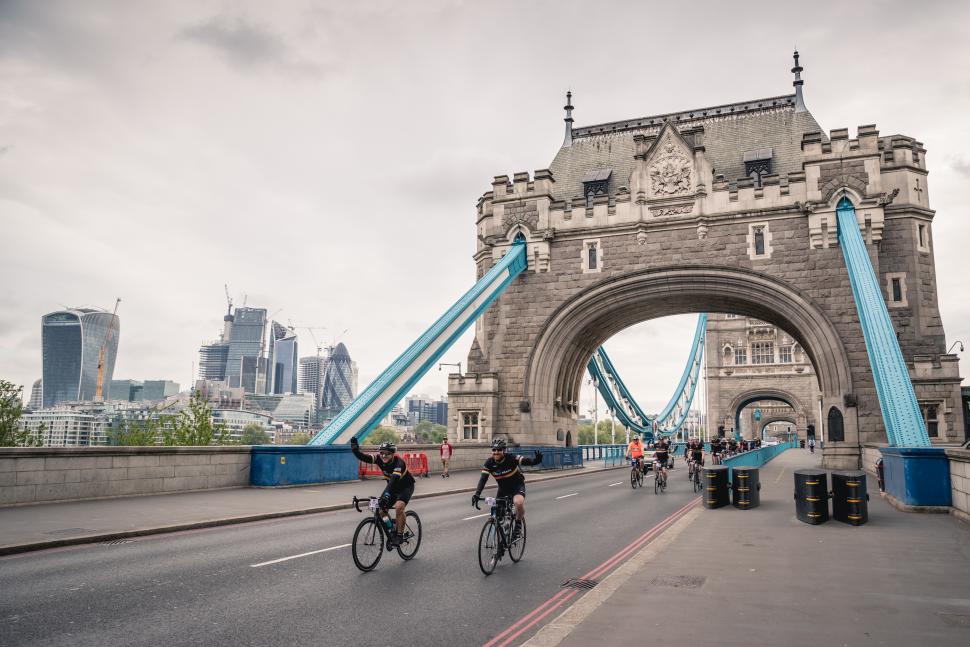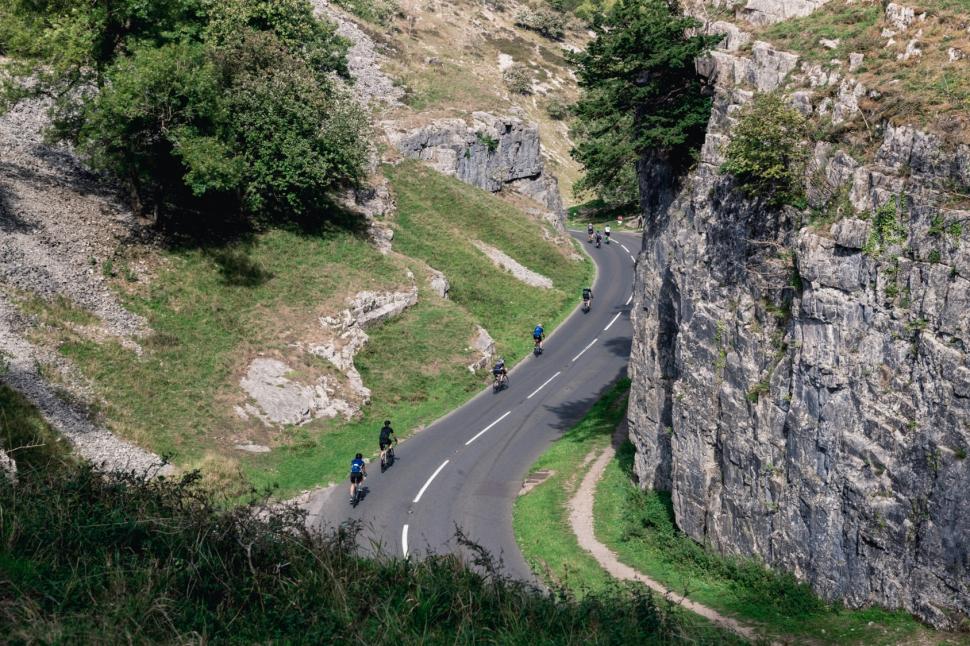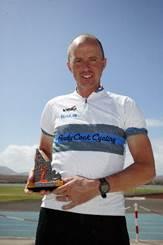- News
- Reviews
- Bikes
- Components
- Bar tape & grips
- Bottom brackets
- Brake & gear cables
- Brake & STI levers
- Brake pads & spares
- Brakes
- Cassettes & freewheels
- Chains
- Chainsets & chainrings
- Derailleurs - front
- Derailleurs - rear
- Forks
- Gear levers & shifters
- Groupsets
- Handlebars & extensions
- Headsets
- Hubs
- Inner tubes
- Pedals
- Quick releases & skewers
- Saddles
- Seatposts
- Stems
- Wheels
- Tyres
- Tubeless valves
- Accessories
- Accessories - misc
- Computer mounts
- Bags
- Bar ends
- Bike bags & cases
- Bottle cages
- Bottles
- Cameras
- Car racks
- Child seats
- Computers
- Glasses
- GPS units
- Helmets
- Lights - front
- Lights - rear
- Lights - sets
- Locks
- Mirrors
- Mudguards
- Racks
- Pumps & CO2 inflators
- Puncture kits
- Reflectives
- Smart watches
- Stands and racks
- Trailers
- Clothing
- Health, fitness and nutrition
- Tools and workshop
- Miscellaneous
- Buyers Guides
- Features
- Forum
- Recommends
- Podcast
 Deloitte Ride Across Britain 1
Deloitte Ride Across Britain 110 mistakes people make when training for a multi-day cycling event
Route Director of Deloitte Ride Across Britain and Dulux London Revolution, Andy Cook looks at the 10 mistakes people make when training for a multi-day cycling event.
1. Not pacing correctly
It's not uncommon for people cycling a multi-day event to go to hard and use up too much energy on day one. Unless you're a pro, chances are you've signed up to a multi-day event to test your ability and most importantly, to have fun. Cycling like this is all about riding at a sustainable and comfortable pace, using energy sparingly. Cycling is as much about saving energy as it is about using it! When I'm coaching, I often use the phrase “Ride comfortably hard NOT hardly comfortable.”
2. Not enough back to back riding
My experience managing cyclists taking part in the iconic nine-day Deloitte Ride Across Britain event is that riders often have not completed enough, if any, "back to back" riding. It's very important that as a cyclist taking on a multi-day event, you get your body used to getting back in the saddle the next day and simply, being able to cycle when you have tired legs and a lack of energy. The more you do it the easier it will get. It's not being used to sitting in your saddle for lengthy periods of time. As any new rider will tell you, getting comfortable in your saddle can take some wearing in! Do not turn up at a multi-day event without having already included multiple big rides (4-6 hours) in your training schedule.
3. Waiting to eat/drink until you feel hungry/thirsty
One of the most important things you will ever learn when cycling is how to fuel yourself effectively. On multi-day events you need to ride at an intensity you can sustain over the course of the event. One big mistake we see is people not refuelling correctly. You should never wait until you are hungry to eat. Nor should you wait until you are thirsty to drink, by that point it will be too late and you risk running out of energy or 'bonking', as it's more fondly known in the cycling world. Eat and drink little and often to ensure you replace the calories you are burning.
Every cyclist differs in what they like to eat whilst out on their bike but it should always be good quality with a balance of carbohydrate (70g-80g an hour) to replace glycogen stores, but also protein to help with muscle recovery. Hydration is also very important, and many people opt for an electrolyte drink/tablets as well as water to replace the electrolytes lost in sweat.
4. Not testing out your kit/bike before the event
We see far too many people turning up at multi-day events on new bikes that have not been fitted correctly or wearing new cycling kit that they haven't already tested out. The problem with this is that you really do need to be as comfortable as possible on the bike. It's not a position your body falls into naturally and so it takes some getting used to. If your bike has not been fitted correctly this can put extra pressure and strain on parts of the body including your neck, shoulders and back which eventually, will turn your cycling experience into a bit of a nightmare. Bike fits are quick and easy to book so I would highly recommend getting one at least six weeks before your multi-day event. Equally, make sure you test new kit in training to ensure it fits correctly, doesn't annoy you by riding up, doesn't rub etc.
5. Bringing too much on the bike
I always advise people to pack only the essentials. We do see a lot of people turning up at events with far too much stuff which they end up having to lug around everywhere. More importantly, if the event you have signed up to has hills, you will want to be as light as possible to make it as easy as possible to get to the top!
6. Not respecting the challenge
Multi-day cycling events should not be undertaken lightly. They are demanding on the body and require a good base level of fitness and enough training beforehand if you are going to cross the finish line. Of course, if you get your training and preparation correct you will have an amazing experience. I would recommend searching for a local cycling club in your area that you can join to help give you additional incentive to get out each week and ride. You can also find some pretty decent training plans online so do your research and find what works for you.
7. Wearing underwear
Padded cycling shorts are designed to be worn with the padded insert next to the skin. Less is more when it comes to cycling and whether you're male or female, wearing underwear underneath your padded cycling shorts will increase the risk of rubbing and sores thanks to the additional material and seams. Lots of padded cycling shorts today also have pads that are specifically designed to clear away sweat, as well as being made of anti-bacterial material which can help prevent infection if you are unlucky enough to get a saddle sore.
8. Not servicing your bike before an event
Even if there isn't anything noticeably wrong with your bike, it is always worth sending it in for a service before your event to make sure there are no underlying problems and to have a general tune up to make the bike as efficient as possible. You do not want to be wasting energy while you are on your bike. We have seen people turn up on a bike that hasn't been serviced to find that on day two or three, the brakes suddenly don't work as well, or the chain is overstretched. All these problems can put a dampener on your experience and worst of all, have the potential to put an end to your event.
9. Not checking the weather forecast
It's important that you check the weather and know the terrain you will be riding on so that you can pack the appropriate kit. Ideally, you will pack for all weather eventualities because cycling kit is designed to be squeezed into small bags to allow for multi-day riding where the weather does vary. The worst thing you can be is too hot or too cold while out on your bike. Prevent this by packing a wind jacket, arm and leg warmers, a waterproof if there's a chance of rain. Your temperature on the bike can change quickly, for example, you may get hot and sweaty climbing a mountain but at the top it's likely to be much cooler. On the descent the wind picks up and it can become very chilly indeed!
10. Trying sports nutrition products for the first time at an event
This is always a bad idea because you don't know how your body will react to that particular product. Without being overly graphic, if energy gels have not been part of your training nutrition plan, for example, I would strongly advise against trying them for the first time at your event otherwise you can quickly find yourself with an upset stomach and with no toilet in sight! It's all about trial and error during your training period. Figure out which products you like the taste of, which give you enough energy to ride over long periods and importantly, which products/foods you can stomach eating over and over again because let's face it, space is limited on your bike.
About Andy Cook
Lifelong cyclist who was fortunate enough to ride for GB, won a few national medals and held British records on a tandem with his wife Jacqui herself a lifelong cyclist. Andy worked for British Cycling from 2005 and created the guidelines associated with the management and organisation of non-competitive cycling events in the UK. Andy was previously the National Chairman of Cycling UK and is currently Chairman of British Cycling South Region. Andy has ridden in excess of 350,000 miles in his lifetime and is a British Cycling club coach and commissare. Andy is the co-founder of Andy Cook Cycling with Jacqui.
About Deloitte Ride Across Britain
Deloitte Ride Across Britain takes place from the 10th to the 18th September 2022. Deloitte Ride Across Britain takes cyclists on a 980-mile route from Land's End to John O'Groats or, 'End to End'. This iconic cycling challenge is a true test of stamina and boasts breath-taking scenery from start to finish. The route is made up of nine stages over nine days and will see cyclists ride over 100 miles each day. From the rugged coastline of Cornwall to the rolling hills and valleys of the North of England, right up the barren majesty of the Scottish Highlands, cyclists will gain a unique perspective of the land as they ride through moorlands, hidden green valleys, winding back lanes, stunning coastal roads and historic sites. Deloitte Ride Across Britain is an event for everyone. From the novice to the elite rider, from young to old, male or female. Past events have even attracted the likes of Mark Cavendish and Hugh Denis who both joined to ride one day of the route.
About SIdley London Revolution
The Sidley London Revolution, the UK's largest two-day cycling sportive, will take place on 1st and 2nd October 2022. This unforgettable weekend will see more than 2,000 cyclists of all ages, levels and abilities ride 300km around the capital. The truly unique 360° loop will take cyclists past incredible views and iconic London landmarks, through hidden green lanes and picturesque villages, over testing climbs and down sweeping descents. On Saturday morning, riders will set off clockwise from Lee Valley Athletics Centre, through central London passing iconic London landmarks including the London Eye, Houses of Parliament, Big Ben and Westminster Abbey. After clearing the city, comes the stunning climbs and descents of the North Downs before heading west towards Windsor Great Park and the overnight basecamp at Windsor Racecourse. The first day will see riders cover 100 miles and climb 4,049 feet. Sunday will bring with it a further 85 miles of riding and 3,556 feet of climbing to make it to the finish. Cyclists will ride through Marlow, along the Thames Valley through historic villages and quaint market towns. Hitting the highs of the Chilterns and riding through Epping Forest, riders will finish at Lee Valley having completed the 360-degree revolution.
Latest Comments
- bobbinogs 3 sec ago
Yepp, fantastic coverage. It seems strange that WBD have forced me to spend less and get better coverage! Thing is, I would have been happy with a...
- David9694 47 min 40 sec ago
+1 on saddle height and also check your lateral alignment - everything should be straight and aligned. My bike fit years ago moved my feet to the...
- froze 51 min 52 sec ago
Everything Lezyne sells are really good, especially their pumps, and the Torque Drive. ...
- wtjs 1 hour 35 min ago
It's not only the UK which suffers from vile louts-VdP is a great athlete who deserves respect!
- Hirsute 2 hours 11 min ago
https://www.youtube.com/watch?v=wOzP87HVCWw
- Rendel Harris 3 hours 37 min ago
Apart from the fact that you're completely wrong - Decathlon is a French company and has 1045 stores in Europe compared to 50 in the UK - whilst...
- hawkinspeter 5 hours 43 min ago
Finally tried out the Smart Lever that I did get for Xmas as I had a suspicious looking bubble/bump on my rear GoodYear tyre (don't think I'll buy...
- chrisonabike 8 hours 46 min ago
Further motoring exemptions have been highlighted by a certain celebrity lawyer: needing the loo, being a well-known footballer...



Add new comment
8 comments
Agree with the above on RAB I was shocked by how little many had done. I was terrified of going home having spent so much and not bring able to complete. I did find Threshold a bit overly supportive of slower riders who hadn't taken it seriously meaning I was covering the cost of chaperones etc. Of Andy's tips in the article I'd say don't carry too much resonates, on RAB there are feed stations every 30 miles, but you'd see most riders carrying 1.5 l of drink + bulging pockets if snacks which all felt like dead weight.
Doing Liege or something else really hard early in the season worked well for me. It meant winter training wasn't think about RAB and then I could just focus on enjoying my summer riding as a build up knowing I already had a strong base. That also provided a good mental thing that no day on RAB would be as hard. Personally I found fitness really built up during he week and bagged a few KOMs in the Highlands.
Whilst on balance I like the recycling of road.cc articles they could of at least put in dates and links for the 2020 events.
2020 Dulux is 9-10th May 2020
Deliotte is 5th-13th Sept 2020
Ha! It's 2021 now, article recycled again, and still with listings of 2019 events.
Hah! I was just muttering to myself that it needed up dating when I saw my old post.
For 2021
https://www.rideacrossbritain.com/
https://www.london-revolution.com/
I rode in the 2017 TCR and thought I was extremely well prepared (see http://blogs.fluidinfo.com/terry/2017/07/25/thoughts-ahead-of-the-2017-t... ). Did 300km a day for 4 days in the event, including crossing the alps, and wasn't even particularly tired etc., riding within myself, with a plan to finish in ~13 days. BUT..... despite over a year of training and preparation, I had what seemed like a potentially very bad knee issue near the end of day #4 and scratched instead of riding up Monte Grappa and possibly doing real damage. Later, a physio diagnosed my issue. Very tight quads that had resulted in the stretching of a ligament connected to the lower part of the kneecap. He said my quads were super tight and asked if I ever did quad stretches by pulling my foot up behind my arse after riding / while warming down. I said no, never. I felt like an idiot.... undone by such a simple oversight / lack of knowledge, after such a huge investment of time and money. I still think about the TCR and kick myself almost every day, after nearly 2 years. So that's someting to consider if you're planning to do multi-day rides with considerable climbing (possibly with a relatively heavily-laden bike).
Oh, and tight well-fitting bike shorts that you have ridden many many miles in. You don't want them to move around at all.
And another thing - train yourself to ride standing up for long periods. It's easy and relaxing, and gives you another position to be in & one that relieves your rear end. I could ride for 2 hours standing up, at an easy pace - just think of it being like walking, or gently climbing stairs, not racing or hard climbing (which is what people often think of when they think out of the saddle). Just a gentle way to ride along. People think that riding out of the saddle is extremely taxing, but I think that's mainly because they don't do it much and it quickly results in pain from little-used muscles. You can train them, and then getting up out of the saddle is itself relaxing and you can do it for long periods without undue fatigue.
Excellent advice. I had thought of doing the Deloitte ride but it wasn't at the right time, so I went solo.
This was one of the biggest thrills, however - planning , re-planning and then re-planning the route again. To ride the route you have planned is a special thrill. Mine is here, aswell as the blog, but I would suggest people really embrace route planning. It whiles away some of the evenings when you are not training on the bike! https://davidslejog.wordpress.com/
I completly agree with Paul. I could not beleive anyone would rock up in Cornwall not having ridden 100 miles before.
I was very nervous starting RAB and certainly never underestimated the challange .I was so glad I had done London Revolution as part of my training and would recomend the London Revolution to anyone new to RAB you get a perfect introduction to Threshold and how they do things plus an insight in to Andy Cook's idea of what is flat and what is not!
The RAB veterans all claimed get to Bath and you will be fine. On the new route this is no longer true. Scotland day 7 & 8 for me were much more challanging but the route is amazing and worth the effort. Looking back at the ride the mental challange of having faith in my training and the ability to keep digging deep was a huge part of the challange. But so much encouragment from the Threshold team, other riders and the RAB bubble are all special.
Do listen to Thresholds and Andy Cook's advice its very good and got me across the finish line without a visit to the medics and my bike only needed a couple of minutes with the mechanics
If you are doing RAB day 9 is worth the effort of cycling almost 900 miles to get there. The route is a bit special and that feeling of "I might actually do this" The whole of the Scotland route really does showcase the stunning landscape.
During the rider briefing at the end of day 1 of RAB last year the team asked anyone for whom that day was their first ever century to raise their hand - it was a bit scary to see just how many had never done a century before. A large minority had never done two big days riding back to back. Many may disagree, but I certainly felt that most of these people hadn't given the challenge the respect it deserved in their preperation. Also, many of those who had done lots of hundred milers and back to back rides were still caught out by how hard RAB was in 2018 - many hadn't adjusted their training to take into account the additional challenge posed by the route change over the cairngorms (some of the multi-RAB veterans were even a bit caught out by this). The 'failure' rate (i.e. the number of people who failed to get through the whole of RAB without being swept up at any point) seemed much higher in previous years